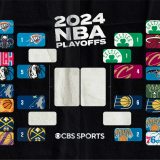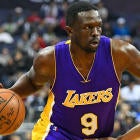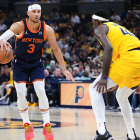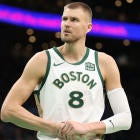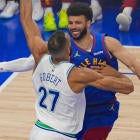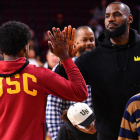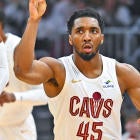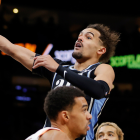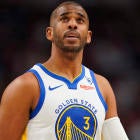
In 2018, the Los Angeles Lakers used the stretch provision to waive Luol Deng and spread the remaining $15 million owed to him over three seasons. That created short-term cap space that they could use in the 2019 offseason as they pursued superstar free agents, but it also left $5 million of dead money on their books for the 2019-20, 2020-21 and 2021-22 seasons. The Lakers wanted that money off of their books altogether, so they applied for a career-ending injury exemption from the NBA in order to do so. The NBA has now rejected the application, according to The Athletic's Shams Charania.
That was always the expected outcome, as we explained in more depth at the time of the application. For an exemption to be granted, a team has to prove that the player in question suffered a career-ending injury while playing for their team. That was always going to be difficult for the Lakers because Deng went on to play 22 games for the Minnesota Timberwolves after leaving Los Angeles. That didn't prevent them from applying. The minimum number of games a player can play before the application becomes illegal is 25, so Deng snuck in under the line, but it gave the Lakers a somewhat flimsy case. The NBA seemingly agrees, as it has rejected the application.
While no team wants dead money on their books at all, the Lakers had two very specific reasons for making this sort of application. The first relates to the 2020-21 season. The Lakers, as we now know through their signing of Montrezl Harrell, expected to use the non-taxpayer mid-level exception this offseason. That triggers a hard cap at the apron, around $138.9 million. The Lakers cannot cross that line for any reason, and even had to trade JaVale McGee to the Cleveland Cavaliers just to create enough room underneath it to sign Marc Gasol. Getting Deng's $5 million off of the books would give the Lakers more breathing room to operate underneath that line, perhaps through in-season trades or the buyout market. Making any sort of major changes to the roster in-season now will be significantly more difficult.
The second is about the 2021 offseason. The Lakers hope to use 2021 cap space to pursue a star free agent, ideally Giannis Antetokounmpo. Doing so will mean clearing the books of any excess salary. At present, only one Laker (Kentavious Caldwell-Pope) has a guaranteed contract for next season. Three others (LeBron James, Montrezl Harrell and Marc Gasol) have player-options. To create enough money for Giannis, the Lakers would likely have to off-load Caldwell Pope and Harrell if he opts in, and James and Anthony Davis would probably have to take slight pay cuts to facilitate his arrival.
There is no legal scenario short of a sign-and-trade that would allow them to pay Davis, James and Antetokounmpo the max. That's basic math. James is eligible to earn up to 35 percent of the cap next offseason. Davis and Antetokounmpo are eligible for 30 percent. That's 95 percent in total, but it does not account for incomplete roster charges, which are minimum salary placeholders for every roster spot below 12 that a team has not filled. If the Lakers had 10 of them, it would cost around $9.3 million. That, in conjunction with maxes for Davis and James, would prevent them from having a third full max slot for Antetokounmpo. Either he would have to take far less than market value, or he, James and Davis would all have to leave a bit on the table. The $5 million on the books for Deng is just another $5 million that the Lakers couldn't pay to their possible superstars.
To be clear, Deng will still be paid every cent his contract dictated. The Lakers merely wanted to wipe the salary off of their books from a cap perspective. The NBA did not see a viable reason to allow them to do so, and now, the Lakers will have to operate around Deng's dead money for the next two seasons as planned.








